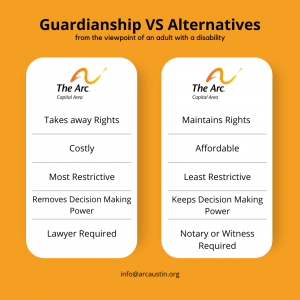Every person with a disability’s transition plan into adulthood looks different. Here at The Arc of the Capital Area, we strive to support clients and families in deciding what path works best for them. Through the Guardianship and Alternatives Program, we train and guide individuals through the next chapter of their life.

What Are Alternatives to Guardianship?
Alternatives to guardianship are options that you can choose to receive support to help you make your own choices without removing your rights. People with IDD can be supported in many ways to make their own decisions. An alternative like a supported decision-making agreement, allows you to choose someone you trust to be an observer or advocate. This document allows the chosen support to provide feedback on available options, enabling you to make a sound decision. Your helper, or supporter, can be someone like your parents or a good friend. They can help you advocate your decision to other people. But, your supporter cannot decide for you. You can change your mind and choose a new person to support you at any time. Choosing your support system allows for more independence and direction on what is important to you as opposed to what others think is important for you.
This is a list of just some of the many ways to support people with disabilities to make decisions without taking away their rights through guardianship.
What is Guardianship?
While most adults with intellectual and developmental disabilities can manage their personal and financial affairs with informal assistance and guidance from family and friends, others need legal protection.
Without guardianship, individuals with disabilities could be left financially, medically, and legally responsible for actions they may not understand or intend to happen. For instance, such individuals may be persuaded to sign a lease on a car or home without fully understanding the consequences or financial obligation. Decision-making ability regarding medical care may also be difficult for some people with disabilities. Individuals with IDD can be vulnerable to inadequate or misdirected medical procedures. For example, a parent may be restricted from making decisions pertaining to the medical needs of their loved one with a disability once they reach age 18.
Protections for People with Guardians
Even if Guardianship is implemented, you still have rights! Your guardian should allow you to have as many rights as possible. Talk to your guardian and tell them you want your rights to choose where you live and work, get married, drive, vote, and make medical choices. You also have the rights listed below unless a judge takes them away.
Under full guardianship of the person, an individual loses many rights, including the right to drive, choose where to live and work, vote, get married, consent to medical treatment, and more. All people need and use support to make important life decisions. Even if a person with a disability needs extra help to make significant life decisions, their right to make their own choices should not automatically be taken away.
As defined by the Texas Probate Code, guardianship is a legal process used to provide protection for adults who are incapacitated. The Probate Code defines an incapacitated person as: “An adult individual who, because of a physical or mental condition, is substantially unable to provide food, clothing, or shelter to himself or herself, to care for the individual’s own physical health, or to manage the individual’s own financial affairs.”
Under guardianship, someone is appointed to make decisions on behalf of the incapacitated person, referred to as the “ward.” There are two main types of guardianships:
- Guardian of the Person: Responsible for the physical well-being of the ward, including making medical decisions and choosing residence
- Guardian of the Estate: Responsible for the ward’s assets
*The Arc of the Capital Area’s Guardianship Program only covers Guardianship of the Person
Bill of Rights for People with a Guardian
Alternatives to Guardianship & Guardianship Program

With support from the Travis County Probate Court and local attorneys providing pro bono assistance, The Arc of the Capital Area staff provides training and education for families to make the appropriate decision on choosing alternatives to guardianship or full guardianship for their family. Team members support families in completing court-required documents while coordinating and attending meetings between prospective guardians, pro bono attorneys, and the bonding company. Prospective guardians participate in a series of workshops led by The Arc and legal experts to educate them on guardianship requirements in preparation for their court appearances.
Admission Criteria:
- Person with disability must be 18 on or before the final court hearing in Mid-May.
- Person with disability must live in Travis County
- Person applying for guardianship must fall under 250% FPL (total household gross income): check here
- Cost: $575.00 *$375.00 may be waived based on program funding
If you would like to be added to the Guardianship interest list click here.
Do I qualify?
Clients must have a developmental disability or a child with a developmental disability and reside in Travis County.
Note: We are currently working to expand our Guardianship program to include Williamson county, but do not serve individuals outside of Travis County at this time. For guardianship services in Williamson County, contact Sharrion Threadgill, Williamson County Probate Court Coordinator, at 512.943.1681.
Is there a charge?
Program fee is $200.00 the lifetime bond fee is $375.00. The Arc of the Capital Area works with pro-bono lawyers to help cover the cost of this lifetime bond fee.
When should I start thinking about guardianship support?
It is recommended that people/parents desiring to obtain guardianship begin researching the requirements near the child’s 16th birthday. Early preparation helps potential guardians as they enter the process. The Arc of the Capital Area’s guardianship services are available when the child is 18 years of age or older.
How do I get on the waiting list?
Persons who are interested in participating in The Arc of the Capital Area’s Guardianship program should contact The Arc of the Capital Area at 512. 476.7044.
What happens after I am placed on the waiting list?
Each year, applicants are invited to participate based on the order of the interest list and the potential ward’s birth date. At this time, applicants are asked to submit proof of household income in order to determine program eligibility. Participants are given a schedule of monthly workshops to be held in preparation for their guardianship hearings.
More Information
Supported Decision Making Information Sheet (English)
Supported Decision Making Agreement (English)
Supported Decision Making Information Sheet and Agreement(Spanish)
Want more information on alternatives to guardianship?
Email: info@arcaustin.org
Guardianship Annual Renewal Packet
(step by step instructions included in the link)
Contact Information
Caleb Alford
Director of Community Services
calford@arcaustin.org
